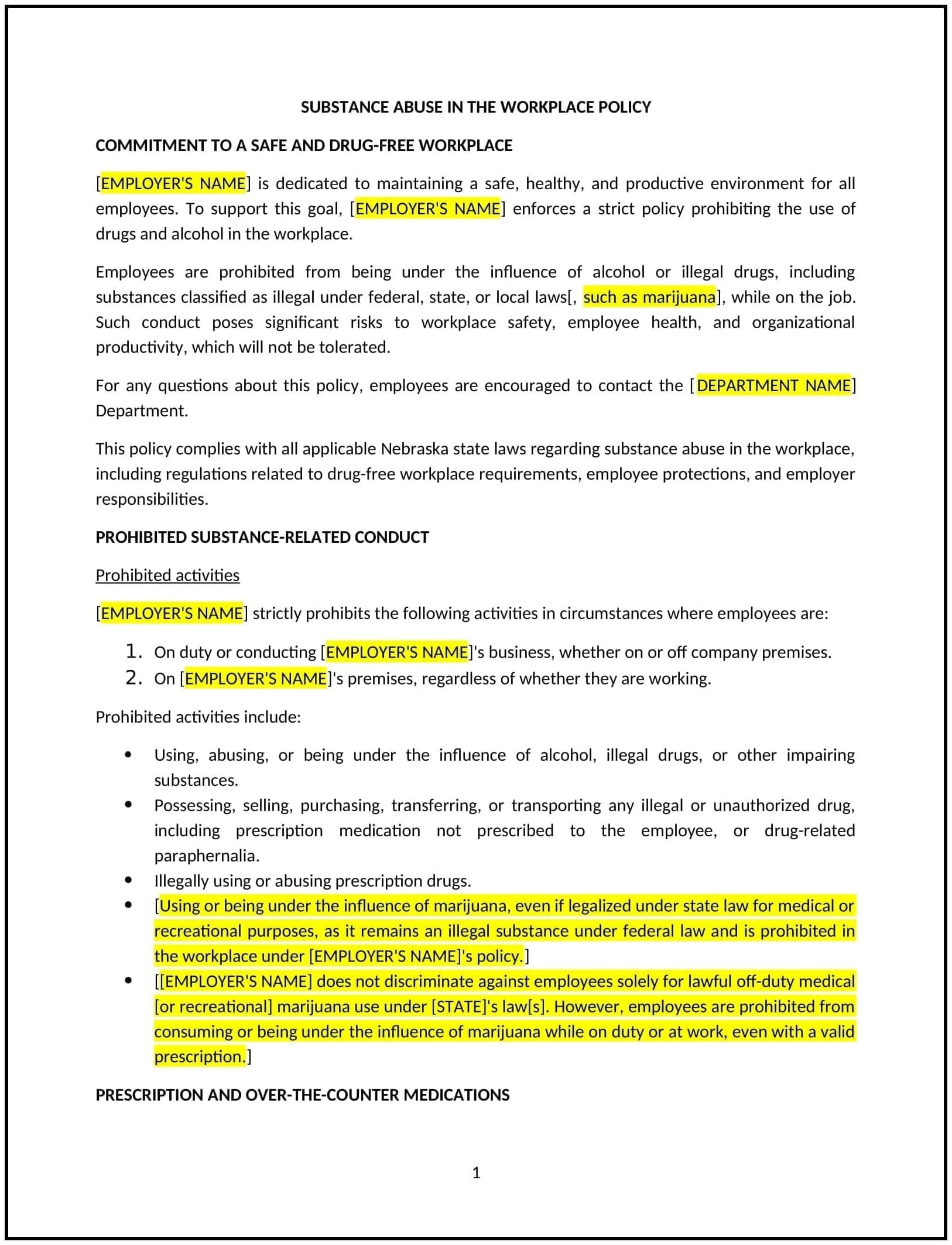Substance abuse in the workplace policy (Nebraska): Free template
Got contracts to review? While you're here for policies, let Cobrief make contract review effortless—start your free review now.

Customize this template for free
Substance abuse in the workplace policy (Nebraska)
A substance abuse in the workplace policy helps Nebraska businesses address the challenges related to employees' use of drugs or alcohol that may affect their job performance, safety, and overall productivity. This policy outlines the company’s expectations regarding substance use, the consequences of violating the policy, and the support available for employees who may be struggling with substance abuse issues. It is designed to create a safe and healthy workplace while offering employees the opportunity to seek help if needed.
By adopting this policy, businesses in Nebraska can protect their employees and ensure that the workplace remains free from the negative effects of substance abuse, while also supporting employees in overcoming addiction.
How to use this substance abuse in the workplace policy (Nebraska)
- Define substance abuse: Clearly define what constitutes substance abuse within the workplace, including the use, possession, or distribution of illegal drugs, alcohol consumption during work hours, or being under the influence while at work. Specify any substances that are prohibited under the policy.
- Outline expectations for behavior: Employees should be made aware that the company has a zero-tolerance policy for substance abuse that negatively impacts job performance, safety, or workplace behavior. Set clear expectations for professional conduct, including refraining from substance use during working hours or while performing job-related duties.
- Specify consequences for violations: Outline the consequences for violating the substance abuse policy, which may include disciplinary action, suspension, mandatory rehabilitation, or termination of employment. The policy should specify the severity of the consequences based on the nature of the violation.
- Provide support and resources: Include information about employee assistance programs (EAPs) and other resources available to employees who may need help with substance abuse issues. Encourage employees to seek help voluntarily and assure them that their privacy will be respected.
- Address testing procedures: If applicable, specify the circumstances under which employees may be subject to drug or alcohol testing, such as pre-employment testing, random testing, or testing following an accident or safety violation. Be sure to outline the procedure for testing and what happens if an employee tests positive.
- Support for rehabilitation and return to work: Establish procedures for employees who seek help for substance abuse issues, including time off for rehabilitation, and how they can return to work following treatment. Clarify any requirements for documentation or performance evaluations after rehabilitation.
- Promote a safe and productive workplace: Reinforce that the primary goal of the policy is to maintain a safe, healthy, and productive work environment for all employees. Encourage employees to report concerns about substance abuse if they believe it is affecting the workplace.
- Review and update: Periodically review and update the policy to ensure it reflects the latest laws, industry practices, and company needs. The policy should be flexible enough to accommodate changes in the law regarding substance abuse or new company initiatives.
Benefits of using this substance abuse in the workplace policy (Nebraska)
This policy provides several benefits for Nebraska businesses:
- Creates a safe workplace: By addressing substance abuse proactively, businesses can reduce the risks associated with impaired performance, workplace accidents, or unsafe behavior, ensuring a safer environment for all employees.
- Improves productivity: Employees who are not dealing with substance abuse issues are more likely to perform better, be more engaged, and contribute positively to the workplace. The policy supports employees by offering help and guidance in managing their issues.
- Reduces legal and liability risks: A clear substance abuse policy helps businesses minimize the risk of lawsuits, workers' compensation claims, or legal issues resulting from accidents or injuries related to substance abuse.
- Supports employee well-being: By providing access to resources and treatment options, businesses can demonstrate their commitment to supporting employees’ health and well-being, improving overall morale.
- Promotes fairness and consistency: The policy ensures that all employees are held to the same standards and that any substance abuse issues are addressed in a fair, consistent manner.
Tips for using this substance abuse in the workplace policy (Nebraska)
- Communicate the policy clearly: Ensure that all employees are aware of the substance abuse policy and the expectations for behavior in the workplace. The policy should be included in employee handbooks and discussed during onboarding.
- Provide employee training: Educate managers and employees on how to recognize signs of substance abuse, the importance of the policy, and how to seek help. This training can help prevent issues before they escalate.
- Encourage voluntary disclosure: Create a supportive environment where employees feel comfortable coming forward with substance abuse issues before they impact their performance. Assure employees that seeking help will not lead to punitive measures.
- Regularly review testing procedures: If drug testing is part of the policy, ensure that employees understand the circumstances under which testing will occur and the procedures involved. Stay updated on relevant laws and best practices regarding testing in Nebraska.
- Follow up with employees after treatment: After an employee completes a rehabilitation program, conduct regular follow-up meetings to support their reintegration into the workplace and monitor their progress in maintaining a substance-free lifestyle.